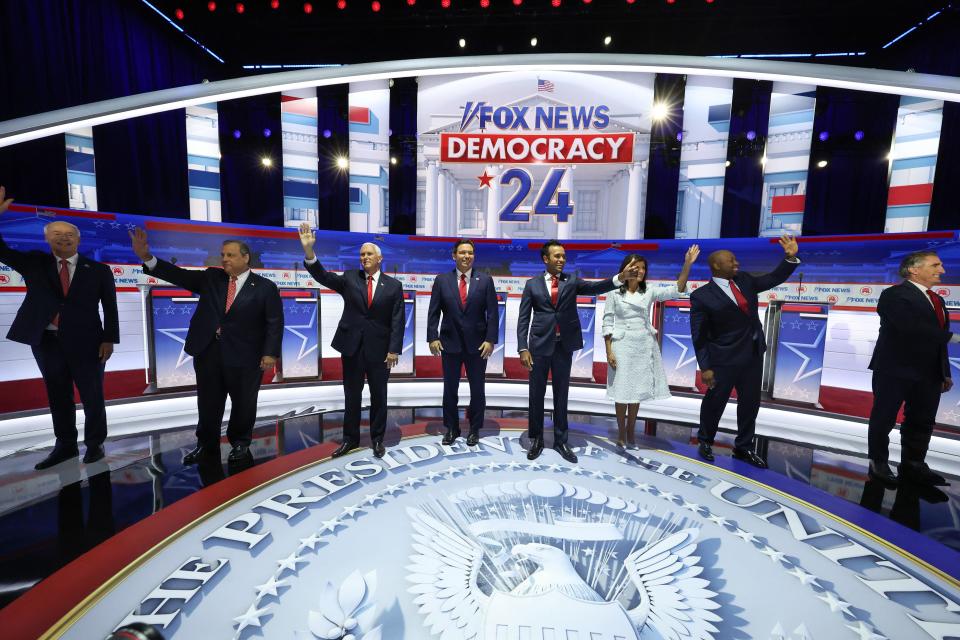Catching up to Donald Trump: Post-debate, Republican rivals look down a long road
- Oops!Something went wrong.Please try again later.
- Oops!Something went wrong.Please try again later.
MILWAUKEE − Republican candidates not named Donald Trump returned to the campaign trail Thursday, hoping their debate performances will jump-start their presidential bids and help them make up ground on the front-running former president.
It's a long-range goal, to be sure.
Trump has such a significant lead in polls on the Republican field that one debate can't possibly close the gap, analysts said. But undaunted rivals said the first debate can be the start of a comeback.
"Look, we're auditioning to be the president of the United States," Florida Gov. Ron DeSantis told Fox News on Thursday, a day after he and seven rivals sparred in the first GOP debate of the 2024 cycle.
Trump, who refused to attend the debate, continued to tout his poll lead, which has grown in recent months despite indictments in four criminal cases.
Debate or no debate, political analysts said, it will take months for any challenger to cut a margin that has grown to more than 40 percentage points according to a Real Clear Politics average of polls.
With actual voting set to begin Jan. 15 with the Iowa caucuses, candidates must improve their campaigns, increase advertising and do well in future debates to try to cut into Trump's lead over the next 4½ months.
"You've got to build it up," said Sean Spicer, Trump's former White House press secretary. "You're not going to make a 15-point jump in one debate."

Republican debaters declare victory
The candidates on stage for Wednesday's debate in Milwaukee declared victory and moved quickly to try to recruit volunteers and voters.
”If you liked what I’ve had to say tonight, join our movement,” former South Carolina Gov. Nikki Haley said on the social media platform X, formerly Twitter.
DeSantis, who headed to Iowa to campaign, said he would continue to stress his experience as governor of Florida, just as he did during the debate.
“There's a lot of people up there that said a lot of things,” DeSantis told Fox News. “I’m the only one that has actually delivered on all these issues.”
Former Vice President Mike Pence said he would continue to run on the success of “the Trump-Pence administration.” Businessman Vivek Ramaswamy continued to promote his claim that “I'm the only person on the stage who isn't bought and paid for," a comment that made him the most criticized candidate at the debate.
At this stage, catching Trump should also include connecting with voters in must-win early voting states, boosting get-out-the-vote operations and delivering more compelling moments in future debates.
"I don't think any single performance is going to make or break any of these candidates," said Alan Schroeder, author of "Presidential Debates: Fifty Years of High-Risk TV." "Everybody gets a couple of chances."
The former president, meanwhile, is doing all he can to keep his rivals down, particularly the second-place DeSantis. His debate team claimed victory Wednesday before the debate ever began, saying the candidates are only auditioning to be on Trump's second-term team.
The next debate is scheduled for Sept. 27 in California, although Trump has indicated he may not attend that event either.
A crowded field
One problem Trump's challengers face: There are so many of them.
The eight candidates who took the stage in Milwaukee tended to attack one another rather than Trump. It's the same dynamic that emerged when Trump won the GOP nomination in 2016.
"The field is too fractured," said Matt Mackowiak, a Texas-based Republican political consultant.
Mackowiak said there is "still a chance someone catches fire in Iowa and changes the race" and noted that "the field will narrow with each debate."
Analysts said Trump's legal troubles could still wear him down, though more challengers need to press the issue for it to become a political problem.
"No one can catch Trump if Trump doesn’t fall," said political scientist Lara Brown.
Brown, author of "Jockeying for the American Presidency: The Political Opportunism of Aspirants," added: "If and when GOP voters realize that nominating him is a suicide mission for their party is the real mystery. I still believe that the more real these trials and possible convictions get, the more desperate the party leaders are going to be to move away from Trump. We’ll see."
'Building momentum'
At this point, a comeback against Trump requires a long grind, analysts said: day by day, week by week, poll by poll, debate by debate.
Aaron Kall, a University of Michigan debate coach who attended the event in Milwaukee, said candidates "have to look at it as a process."
"It's about gradually building momentum."
This article originally appeared on USA TODAY: Catching Donald Trump: Post-debate, Republican rivals have long road
